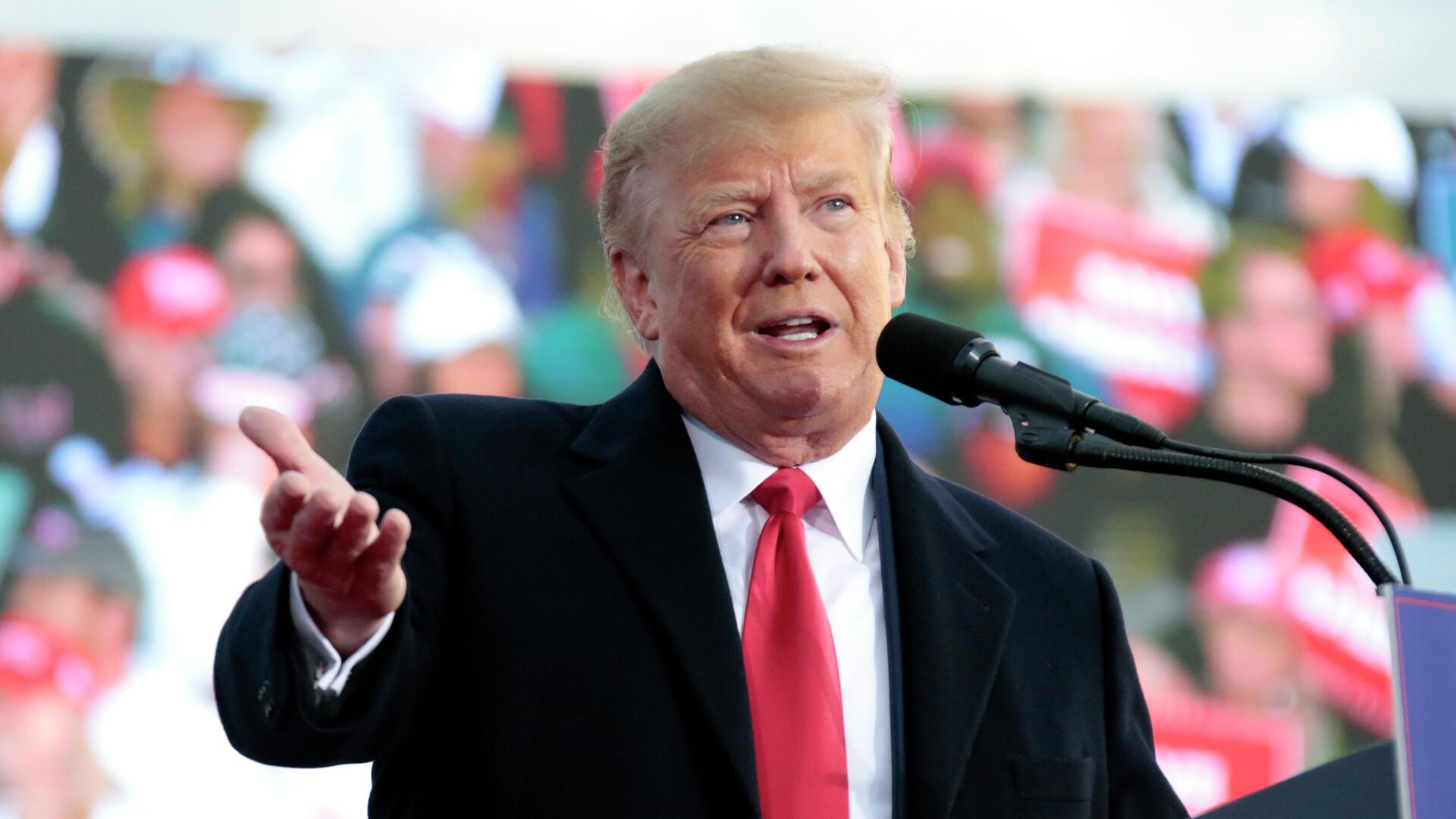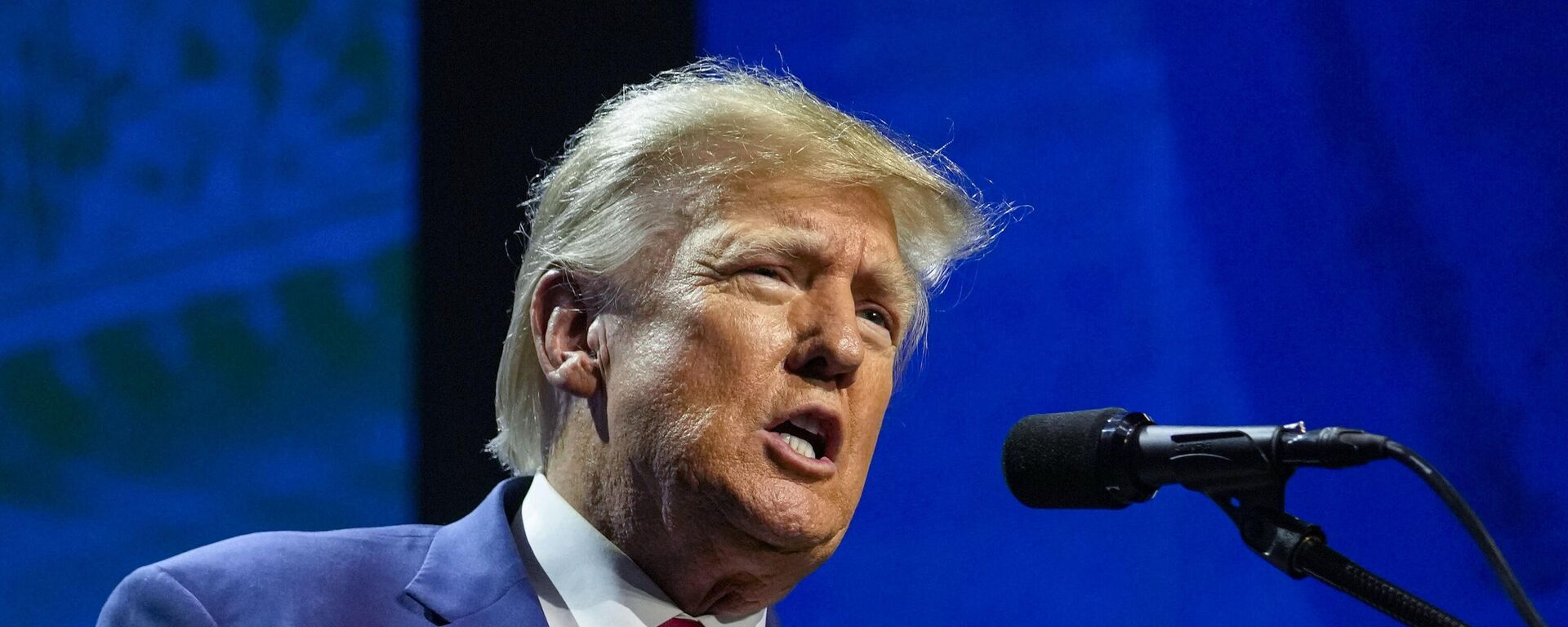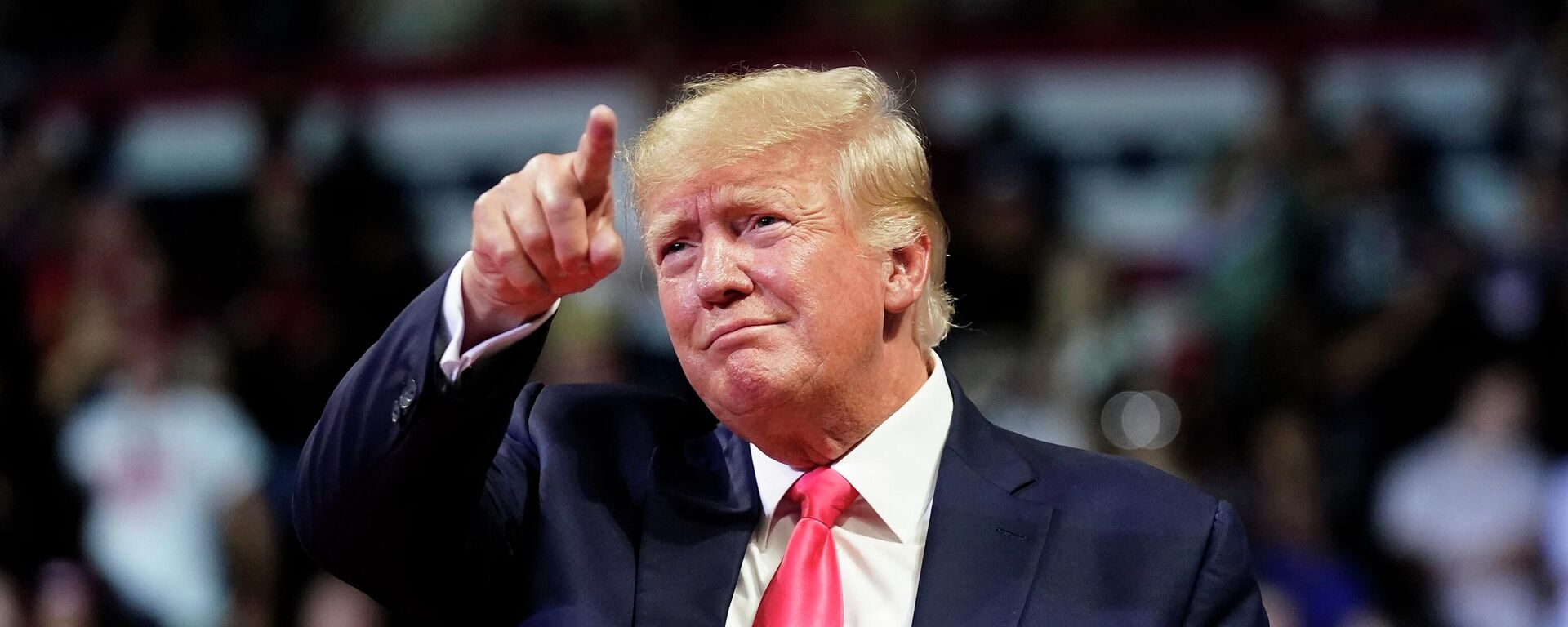https://sputnikglobe.com/20230611/could-trump-pardon-himself-if-he-wins-in-2024-1111064402.html
Could Trump Pardon Himself If He Wins in 2024?
Could Trump Pardon Himself If He Wins in 2024?
Sputnik International
Former President Donald Trump remains the GOP primary frontrunner - meaning he has a shot of winning the 2024 race. In that case, he may try to set historical precedent by using the Constitutional Pardon Clause to nullify his own federal charges.
2023-06-11T13:30+0000
2023-06-11T13:30+0000
2023-06-11T19:18+0000
americas
donald trump
richard nixon
new york
georgia
washington dc
republican
gop
us supreme court
jonathan turley
https://cdn1.img.sputnikglobe.com/img/07e6/04/18/1095019832_0:0:3071:1728_1920x0_80_0_0_eb3d0699f6cc6c2d22c8771286edeef5.jpg
Donald Trump has become the first former president in history to face a federal criminal indictment. Yet, he is also a Republican presidential candidate who tossed his hat into the ring last year.The former president's poll numbers look impressive enough to suggest that there is a chance he may hypothetically outperform both his Republican and Democratic rivals. If Trump manages to win the presidency in 2024, he would be authorized by the US Constitution to grant a pardon for any federal crime.Presently, the ex-president is facing a staggering 37 criminal charges for his alleged mishandling of classified documents. He has also been charged in a New York "hush money" case, while in Georgia, Trump is being probed for his apparent attempt to overturn the state's 2020 election results. Likewise, in Washington DC, a DoJ special counsel is pushing a probe into Trump's conduct around the US Capitol breach on January 6, 2021, to name but a few cases.Could Trump Pardon Himself From the Oval Office?Renowned criminal defense attorney Jonathan Turley believes that "yes, he can."Some other legal experts disagree, referring to the Justice Department Office of Legal Council's memo dated August 5, 1974, and issued just before then-President Richard Nixon resigned: "Under the fundamental rule that no one may be a judge in his own case, the President cannot pardon himself."In fact, nobody knows whether it is possible for a president to pardon himself, famous American lawyer Alan M. Dershowitz wrote in his July 2017 op-ed. Indeed, the US Constitution provides no guidance, the Framers never opined on that, and there has never been such a precedent in US history. "We will have to learn to live with the uncertainty of never knowing whether a president has the constitutional authority to pardon himself," the legal expert summed up at the time.Still, Trump entertained the idea of pardoning himself in the so-called "Russia collusion" case which turned out to be a big-nothing-burger while serving his first tenure. "I have an absolute right to pardon myself," then President Trump told the press in 2018, adding that he would not do that since he did nothing wrong.Weighing the pros and cons of Trump's ability to pardon himself, the US mainstream press cites the fact that, according to the US Constitution, only "federal" cases could be subject to a presidential pardon. That apparently means that the much-discussed Pardon Clause wouldn't cover the cases brought against Trump by US states.Another probability is that Trump's potential attempt to pardon himself would be eventually decided by the Supreme Court. As per the US mainstream media, the mostly-conservative SCOTUS could play into the hands of Trump in this case.
https://sputnikglobe.com/20230609/trump-faces-38-criminal-counts-including-willful-retention-of-sensitive-info-indictment-1111033963.html
https://sputnikglobe.com/20230319/why-trumps-indictment--conviction-cant-axe-his-2024-bid-but-may-enhance-his-election-odds-1108562603.html
americas
new york
georgia
washington dc
Sputnik International
feedback@sputniknews.com
+74956456601
MIA „Rossiya Segodnya“
2023
News
en_EN
Sputnik International
feedback@sputniknews.com
+74956456601
MIA „Rossiya Segodnya“
Sputnik International
feedback@sputniknews.com
+74956456601
MIA „Rossiya Segodnya“
trump federal charges, trump federal indictment, trump 2024 bid, can trump pardon himself, can trump use pardon clause as president, pardon clause, us constitution, us president's pardon powers, us 2024 presidential election
trump federal charges, trump federal indictment, trump 2024 bid, can trump pardon himself, can trump use pardon clause as president, pardon clause, us constitution, us president's pardon powers, us 2024 presidential election
Could Trump Pardon Himself If He Wins in 2024?
13:30 GMT 11.06.2023 (Updated: 19:18 GMT 11.06.2023) Former President Donald Trump remains the GOP primary frontrunner - meaning he has a shot of winning the 2024 race. In that case, he may try to set historical precedent by using the Constitutional Pardon Clause to nullify his own federal charges.
Donald Trump has become the first former president in history to face
a federal criminal indictment. Yet, he is also a Republican presidential candidate who tossed his hat into the ring last year.
The former president's poll numbers
look impressive enough to suggest that there is a chance he may hypothetically outperform both his Republican and Democratic rivals. If Trump manages to win the presidency in 2024, he would be authorized by the US Constitution to grant a pardon for any federal crime.
A US president has clemency power under the Pardon Clause, which says that the president "shall have Power to grant Reprieves and Pardons for Offenses against the United States, except in Cases of Impeachment."
Presently, the ex-president is facing a staggering 37 criminal charges for his alleged mishandling of classified documents. He has also been charged in a New York "hush money" case, while in Georgia, Trump is being probed for his apparent attempt to overturn the state's 2020 election results. Likewise, in Washington DC, a DoJ special counsel is pushing a probe into Trump's conduct around the US Capitol breach on January 6, 2021, to name but a few cases.
Could Trump Pardon Himself From the Oval Office?
Renowned criminal defense attorney Jonathan Turley believes that "yes, he can."
"Trump could run on pardoning himself," Turley told an American broadcaster earlier this week. "For people that feel that this is biased, that this is part of a pattern, he could turn this on his opponents and actually run on his right to pardon himself. So, if he's elected, even if he's convicted, he could pardon himself or he could do so before a trial occurs."
Some other legal experts disagree, referring to the Justice Department Office of Legal Council's memo dated August 5, 1974, and issued just before then-President Richard Nixon resigned: "Under the fundamental rule that no one may be a judge in his own case, the President cannot pardon himself."
In fact, nobody knows whether it is possible for a president to pardon himself, famous American lawyer Alan M. Dershowitz wrote in his July 2017 op-ed. Indeed, the US Constitution provides no guidance, the Framers never opined on that, and there has never been such a precedent in US history. "We will have to learn to live with the uncertainty of never knowing whether a president has the constitutional authority to pardon himself," the legal expert summed up at the time.
Still, Trump entertained the idea of pardoning himself in the so-called "Russia collusion" case which turned out to be a big-nothing-burger while serving his first tenure. "I have an absolute right to pardon myself," then President Trump told the press in 2018, adding that he would not do that since he did nothing wrong.
Weighing the pros and cons of Trump's ability to pardon himself, the US mainstream press cites the fact that, according to the US Constitution, only "federal" cases could be subject to a presidential pardon. That apparently means that the much-discussed Pardon Clause wouldn't cover the cases brought against Trump by US states.
Another probability is that Trump's potential attempt to pardon himself would be eventually decided by the Supreme Court. As per the US mainstream media, the mostly-conservative SCOTUS could play into the hands of Trump in this case.
Still, a SCOTUS potential interference could provoke another legal dispute as to whether the US courts have jurisdiction to review a presidential self-pardon under the US system of separation of powers. Whether one likes it or not, the presidential power to pardon is an important part of the Constitutional scheme of checks and balances, legal experts have said.




